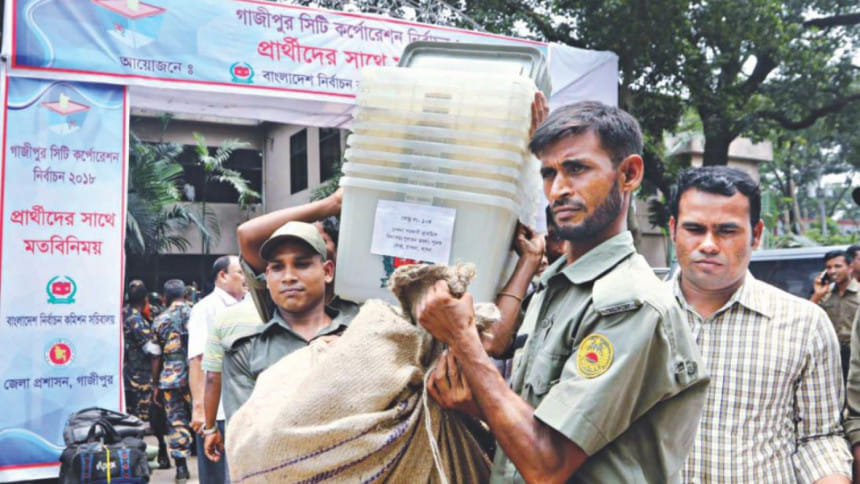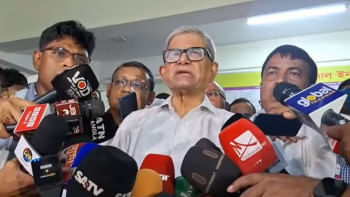Why do we need an acceptable election?

Readers may recall the very mischievously poignant slogan of deviant students of yesteryears who were bent upon adopting unfair means to pass public examinations. It so happened that after the farcical election of 1988, characterised by massive election engineering, students chanted slogans like "election hoiche jemne, porikkha hoibo shemne", meaning that examination would be held in the same fashion as the election was.
It does not require much sense to trace the evil-doer behind such foul utterances. However, a proper introspection would also reveal that the unfair means the students were adopting actually questioned the propriety of the elected representatives who resorted to fraudulent methods to assume the mantle of leadership. In effect, they were saying that if someone can become a legislator, thus the guardian of the polity through unfair means, then the students also have the right to pass examination by adopting unfair means.
Beyond the educational arena, if we venture to study the ill effects of unfair election on the broader social canvas, we will come across a distressingly all-pervasive corrosion sapping the vitality of a nation. Thus, if a tainted regional or national election can somehow acquire the seal of legitimacy, then elections to numerous other entities like professional bodies including those of physicians, engineers, lawyers, agriculturists, labour organisations, educational institutions and financial institutions would be similarly affected. Needless to say, the impact would be devastating. Only at our own peril can we allow the decay of the corrective institutions.
The above observations have been made because complaints about serious irregularities committed during the recently held mayoral elections are giving rise to premonitions about the holding of a credible national election, scheduled to be held later this year or early next year. In a democracy, election is the only acceptable method for selecting political leaders and governments throughout the world. Election is also a political process through which the people choose their representatives for the political institutions.
If we look back, we will find that the historic election of 1946 in British-ruled India, the elections of 1954 and 1970-71 in the then East Pakistan were an eloquent verdict of the people's will. It thus follows that the election of representatives of various elective bodies by the people of Bangladesh who are eligible to vote is one of the basic requirements of democracy. Our constitution stipulates that "effective participation by the people through their elected representatives in administration at all levels shall be ensured."
In fact, it is the people, the electorate, that confers the power to govern and calls the government to account. For the people to enjoy true equality in constitutional participation, the voting system has to be such that it can produce both a legislative body representative of the electorate and a government with sufficient democratic support to be able to govern effectively. The electoral process requires that the conduct of election campaigns is regulated to ensure legality and fairness.
To state the obvious, unless legality and fairness is firmly ensured, the rulers in a democracy shall not be able to wield the moral authority so essential to govern effectively and constitutionally.
Let us remember that when a republic comes to birth, it is the leaders who produce the institutions. Later, it is the institutions that produce the leaders. So the nation-building institutions need to be nurtured. We need to note that the timing of a political breakdown principally depends upon the strength of political institutions. There is wisdom in the belief that an economic failure cannot overtake a country where the political institutions have acquired durability through age and tradition.
As a nation, our problem may appear to be largely economic and may show themselves through price hikes, shortages and industrial disputes. However, underlying the symptoms is a disease which has destroyed democracies in the past and the causes of that disease are not economic. They are moral, political and constitutional, and in order to cure the disease, we must recognise them as such.
In the end, it may be worthwhile to remember the wise worlds of John Stuart Mill: "The worth of a State, in the long run, is the worth of individuals composing it. A State which dwarfs its men in order that they may be more docile instruments in its hands even for beneficial purposes—will find that with small men no great thing can really be accomplished and that the perfection of machinery to which it has sacrificed everything will, in the end, avail it nothing."
Muhammad Nurul Huda is a former IGP and a columnist at The Daily Star.





Comments